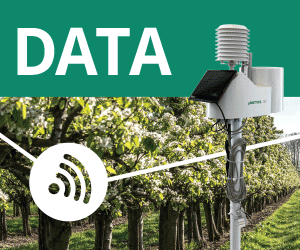Targeted pollination can double the yield of soft fruit and increase the quality of the produce. To enable farmers to increase pollinator levels, AgriSound is launching an insect listening device called POLY, which displays a heat-map on a mobile device to show insect activity. It highlights pollination deficits on-farm as well as providing proof that interventions increase ecosystem services.
The window for pollination is very tight – two weeks for almonds – so it is crucial to ensure that sufficient bees or other pollinators are available at the right time.
Casey Woodward, CEO of AgriSound, presented in the Start-Up Showcase at Agri-TechE’s REAP 2021 conference. He explains: “In the UK most fruit growers have some hives and then bring in a local beekeeper to boost the numbers of bees as required. POLY is an acoustic sensor that identifies the insects by their sounds. If this shows insufficient pollinators, then the farmer is able to quickly respond. Insights gained over time can help inform habitat improvements, and there is government support for this.”
The POLY devices are pre-installed with the software, all ready to stick in the ground. Each sensor covers up to one hectare, then data collected by the AgriSound network is converted into a pollinator heat-map on the user’s smartphone app, as well as tracking pollinator numbers over time.
POLY is currently being trialled by fruit growers and suppliers Bardsley England.
Casey says: “In apples, getting pollination right could lead to yields improving by £12-15k/hectare on average in the UK. Bardsley England has been trialling POLY over the season in a real-world farming environment. The feedback we’re getting is incredibly positive – it is providing brand new insights that people have never had before.”
In the UK, berry crops, apples, pears, and energy crops such as rapeseed are all highly reliant on targeted pollination. Casey explains: “In strawberries, bumble bees are used in the polytunnels. Effective pollination means a higher proportion of Class I produce; this can be the difference between selling whole fruit punnets versus blending for juice.”
As well as working with growers in Suffolk and Herefordshire, AgriSound is collaborating with the National Trust in Scotland to investigate deploying the sensors in gardens across the UK and to encourage the public to increase bee populations in their gardens. The visitors can scan a QR code on POLY to see the insect activity.
“A countrywide network of sensors would have huge value in supporting governments with data-led policy-making. In the UK, the government gives subsidies for land management decisions such as hedgerows and wildflowers – our sensors would be able to identify the areas in greatest need of those subsidies.”
Following projected changes in farm payment schemes, farmers will start to be rewarded for protecting biodiversity – “if there’s a need for impartial evidence that biodiversity levels are being maintained, that’s where our technology can play a really important role,” Casey points out.
Picture caption: AgriSound conducted trials with POLY on strawberry plants.














